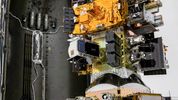Space technology affects our daily lives, particularly in addressing one of the most pressing global challenges: food security. With its array of satellites and sensors, the space industry has emerged as an ally in ensuring a sustainable and resilient food supply for the planet.
With a rapidly growing global population and the persistent threat of climate change, the need to produce more food, efficiently manage resources, and adapt to changing environmental conditions has never been more critical. The space industry offers game-changing solutions that revolutionise agriculture and enhance food production worldwide.
At the forefront of these solutions are Earth observation satellites. These satellites provide invaluable data on crop health, soil moisture levels, weather patterns, and land use, empowering farmers and decision-makers with real-time information to optimise agricultural practices. Companies like Taranis, for example, help agribusinesses build better, more informed value chains through submillimetre image capture and advanced crop intelligence models. By leveraging satellite imagery and advanced analytics, farmers can identify stress areas, monitor crop growth, and implement targeted interventions, ultimately increasing yields and minimising resource waste.
Space-based technologies play a crucial role in mitigating the impact of climate change on agriculture. By monitoring climate trends and predicting extreme weather events, satellites enable early warning systems that help farmers prepare for and adapt to adverse conditions. This proactive approach, whether droughts, floods, or pests, allows for timely information from space to implement measures to protect crops and safeguard food supplies.
However, the benefits of the space industry extend beyond terrestrial agriculture. Advances in space farming, including experiments conducted on the International Space Station (ISS), offer insights into sustainable farming practices that could revolutionise food production on Earth and in space. From cultivating crops in microgravity to exploring new farming techniques, these experiments not only push the boundaries of science but also hold immense potential for enhancing food security on a global scale.
From satellite constellations providing ubiquitous coverage to cutting-edge technologies like precision agriculture and vertical farming, the space industry continues to innovate and drive progress in food security.
 unknownx500
unknownx500











